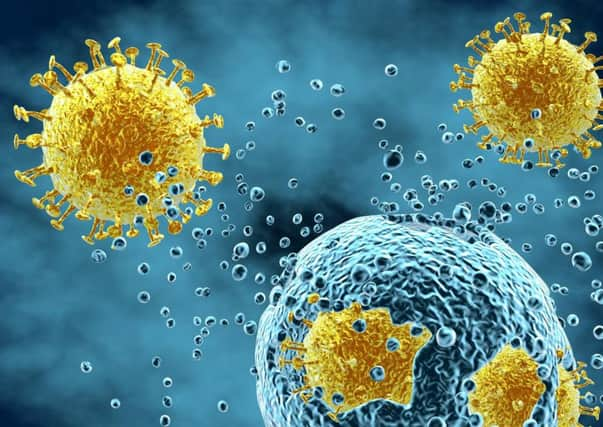Common cold virus can kill bladder cancer cells


Scientists found the particular strain called coxsackievirus (CVA21) destroys cancerous tumours on the organ’s inner lining.
Bladder cancer patients were given a dose of the virus through a catheter one week before they were due to undergo surgery to remove tumours.
Advertisement
Hide AdAdvertisement
Hide AdIn one patient all signs of the disease disappeared. In another 14 there was evidence that cancer cells had died.
When tissues samples were analysed after surgery, there were signs the virus had targeted and killed cancer cells in the bladder.
Once these cells had died, the virus had then reproduced and infected other cancerous cells - but all other healthy cells were left intact.
Non-muscle invasive bladder is the 10th most common cancer in the UK, with around 10,000 new cases each year.
Incidents of bladder cancer are worse in Scotland than the rest of the UK, with 870 diagnoses in 2016 – 50 men and 290 women – with a higher proportion of women in particular.
The five-year survival rate for women in Scotland is 34 per cent compared to 48 per cent for the rest of the UK.
University of Surrey researchers said the virus could “help revolutionise treatment” for the cancer and reduce the risk of it recurring.
Study leader Prof Hardev Pandha from the University of Surrey and Royal Surrey County Hospital, said: “The virus gets inside cancer cells and kills them by triggering an immune protein - and that leads to signalling of other immune cells to come and join the party.”
Advertisement
Hide AdAdvertisement
Hide AdCurrent treatments for this type of bladder cancer are invasive or can cause serious, toxic side effects.
Constant, costly monitoring is needed to check cancer has not returned after treatment.
However, no side effects were found in patients treated with the virus via a catheter to the bladder
Allen Knight, chairman of Action Bladder Cancer UK, said bladder cancer costs the NHS more per patient than nearly every other cancer, because of the high recurrence rate.
“If the safety, tolerability, and efficacy data can be confirmed in larger clinical studies and trials, then it could herald a new era in the treatment for non-muscle-invasive bladder cancer patients, like me, who often feel that innovations in cancer therapies pass us by.”
The team will use the virus with a targeted immunotherapy drug treatment, a checkpoint inhibitor, in a future trial with more patients.